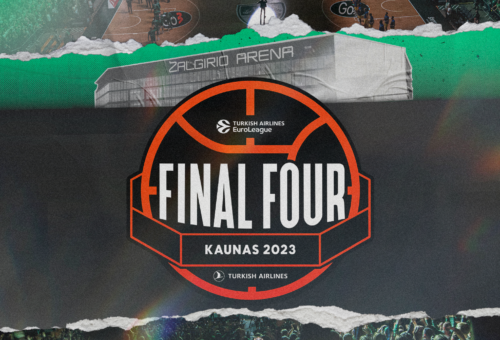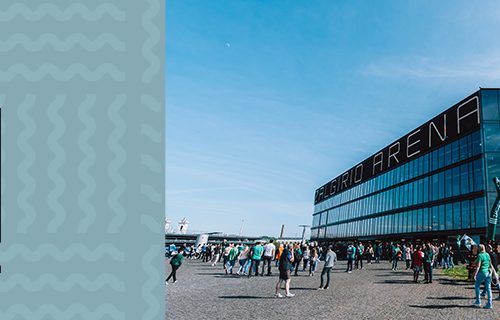Andy West is a sports, culture and politics writer originally from the UK and now living in Barcelona. He wrote a piece about Zalgirio arena and Zalgiris Kaunas to the column of the MalayMailOnline.
—
You’ve got to love Zalgiris Kaunas.
I’m sure many of you have absolutely no idea who or what Zalgiris Kaunas might be, but bear with me because their story is a heartwarming one for any sports fan.
Zalgiris is a basketball club, based in the small Lithuanian city of Kaunas.
There’s nothing particularly notable about Kaunas. It has a population of around 300,000, a well-regarded university, a very pleasant old town set around cobbled streets and a large riverside park, and a surprisingly vibrant market for second-hand cars.
And it has basketball.
Lithuania is one of those rare places (outside North and Central America) which does not regard football as its number one sport.
That’s largely due to the weather conditions, with the country’s positioning on the shores of the Baltic Sea in the far north of Europe providing brutal winters which make outdoor sports more or less impossible for five months of the year.
Instead, the climate is far better suited to indoor pursuits, and unlike some other Eastern European states which have primarily embraced ice hockey, in Lithuania basketball is king. And specifically, Kaunas is the breeding ground of talent.
Kaunas is one of those strange anomalies: A small town which boasts an unusual level of sporting excellence.
For years, a steady stream of talent has progressed through Zalgiris’s youth system, with countless players going on to represent the senior team, other European clubs and a decent number also making their way to the zenith of the sport, the NBA in America.
The passion for basketball in Kaunas and the consequent reliable supply of homegrown talent has allowed Zalgiris to punch way above its weight for several decades, with the club winning the EuroLeague title — the continent’s top club honour — in 1999, and regularly holding their own with clubs boasting far bigger resources such as Russian giants CSKA Moscow and Spanish heavyweights Real Madrid and Barcelona (who are financed by their better-known sister football clubs).
This year has been a particularly good one for Zalgiris. Under the outstanding coaching of former player Sarunas Jasikevicius, who won four EuroLeague titles during a glittering playing career, the club has succeeded in reaching the EuroLeague playoffs for the first time this century.
That’s no small achievement. Unlike its football equivalent the Champions League, the competition is a genuine league, with Europe’s best 16 clubs playing home and away in a round robin format over 30 games and seven gruelling months before the top eight teams head into the playoffs.
This week, despite operating with the second lowest budget in the league, Zalgiris beat visiting Olimpia Milan to ensure a finish in that all important top eight with two rounds still remaining. The playoffs beckon for the first time this century.
It has been achieved with an under regarded squad completely lacking in star names, with disciplined coaching from Jasikevicius, a fierce will to win, highly professional efficiency in all aspects of play, seven players from the youth system and proud backing from the club’s ever loyal fans.
Those fans, indeed. I’ve had the pleasure of attending a couple of Zalgiris home games and can confirm there are few sports fans anywhere in the world as passionate, knowledgeable and faithful as Zalgiris supporters.
In addition to the overachievement of their players, another reason for Zalgiris fans to be happy is their home venue, which rivals the 02 Arena in London as the best indoor arena I’ve seen in Europe.
Part of the ultra modern 15,000 capacity Zalgirio Arena’s considerable charm is its location, perched on a broad island on the river just a short stroll from the old town centre: Walking across the bridge, snow crunching underfoot on a cold winter night, with the green and black neon-lit arena sparkling ahead of you is one of the most evocative sporting experiences you could ever have.
The fact that the arena even exists is remarkable enough. You would expect the most hi-tech and aesthetically pleasing sports venue in Europe to be found in somewhere like Paris, Berlin or Rome. But Kaunas? Such a wonderful venue being built in such a small town is bizarre to say the least, and speaks volumes for the central role played by Zalgiris in the cultural and social life of the region.
With qualification for the playoffs secured, the arena will soon host perhaps the most important games since its doors first opened in 2011. The playoffs present a best of five game series, with the winners of each quarter final tie progressing to the decisive Final Four weekend, which will take place this year in Belgrade in mid-May.
Potential opponents for Zalgiris in the last eight include Real Madrid, CSKA Moscow, reigning champions Fenerbahce Istanbul or one of the Greek giants, Panathinaikos or Olympiacos. They will all be extremely tough opponents, with resources far outstripping those available to the Lithuanian team. But the way they’ve played this season, Zalgiris have a chance of upsetting the odds and going all the way to the title, which would be perhaps the biggest upset in European basketball history.
And if they can pull it off, it would be a triumph for any neutral sports fans to celebrate.

The 2023 EuroLeague Final Four will take place in Zalgirio... More »

Zalgirio Arena is setting up to provide the opportunity to... More »